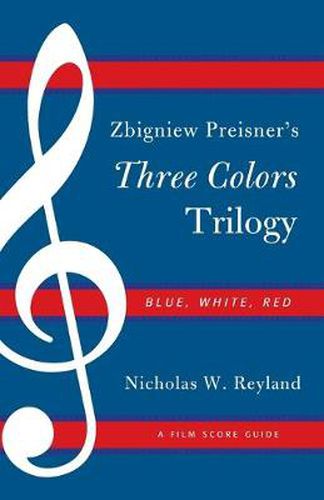Readings Newsletter
Become a Readings Member to make your shopping experience even easier.
Sign in or sign up for free!
You’re not far away from qualifying for FREE standard shipping within Australia
You’ve qualified for FREE standard shipping within Australia
The cart is loading…






This title is printed to order. This book may have been self-published. If so, we cannot guarantee the quality of the content. In the main most books will have gone through the editing process however some may not. We therefore suggest that you be aware of this before ordering this book. If in doubt check either the author or publisher’s details as we are unable to accept any returns unless they are faulty. Please contact us if you have any questions.
Director Krzysztof Kieslowski’s Three Colors trilogy-Blue (1993), White (1993), and Red (1994)-is one of the great achievements of European film. A meditation on liberty, equality, and fraternity, these three films marked the culmination of the director’s career, as well as the zenith of one of the most important creative collaborations in 20th-century cinema-between Kieslowski, scriptwriter Krzysztof Piesiewicz, and composer Zbigniew Preisner. Thanks to their close working relationship, music for the Three Colors trilogy achieves both a focal narrative and philosophical function. At times, Preisner’s music advances the narrative independently of the films’ other codes; at other times, it creates a metaphorical space into which the audience is invited in order to read for deeper messages. As the first major scholarly treatment of Preisner’s music, Nicholas Reyland’s Zbigniew Preisner’s Three Colors Trilogy: A Film Score Guide fills an important void in film score scholarship. In this guide, Reyland analyzes the historical context of the film scores, the life of the composer, the hermeneutic and narrative role of the music within the film, and the musical scoring techniques used for the trilogy. This volume also draws on an interplay of established classic approaches to analyzing film music and more recent approaches in the exploration of its themes and readings. In addition, the composer’s willingness to be interviewed by Reyland enhances the musicological scholarship of this book, giving the reader privileged access into the process of scoring. A significant contribution to both film studies and musicological literature, this book celebrates one of the great cinematic achievements of the last few decades.
$9.00 standard shipping within Australia
FREE standard shipping within Australia for orders over $100.00
Express & International shipping calculated at checkout
This title is printed to order. This book may have been self-published. If so, we cannot guarantee the quality of the content. In the main most books will have gone through the editing process however some may not. We therefore suggest that you be aware of this before ordering this book. If in doubt check either the author or publisher’s details as we are unable to accept any returns unless they are faulty. Please contact us if you have any questions.
Director Krzysztof Kieslowski’s Three Colors trilogy-Blue (1993), White (1993), and Red (1994)-is one of the great achievements of European film. A meditation on liberty, equality, and fraternity, these three films marked the culmination of the director’s career, as well as the zenith of one of the most important creative collaborations in 20th-century cinema-between Kieslowski, scriptwriter Krzysztof Piesiewicz, and composer Zbigniew Preisner. Thanks to their close working relationship, music for the Three Colors trilogy achieves both a focal narrative and philosophical function. At times, Preisner’s music advances the narrative independently of the films’ other codes; at other times, it creates a metaphorical space into which the audience is invited in order to read for deeper messages. As the first major scholarly treatment of Preisner’s music, Nicholas Reyland’s Zbigniew Preisner’s Three Colors Trilogy: A Film Score Guide fills an important void in film score scholarship. In this guide, Reyland analyzes the historical context of the film scores, the life of the composer, the hermeneutic and narrative role of the music within the film, and the musical scoring techniques used for the trilogy. This volume also draws on an interplay of established classic approaches to analyzing film music and more recent approaches in the exploration of its themes and readings. In addition, the composer’s willingness to be interviewed by Reyland enhances the musicological scholarship of this book, giving the reader privileged access into the process of scoring. A significant contribution to both film studies and musicological literature, this book celebrates one of the great cinematic achievements of the last few decades.